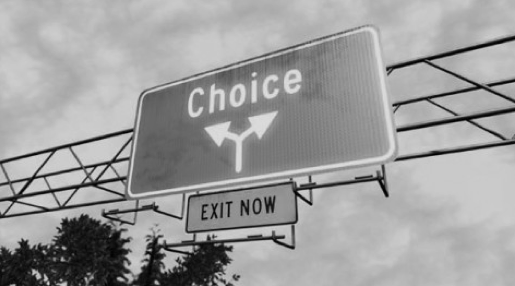A few weeks ago I asked readers what one problem they would like solved. Salina had a really interesting question regarding decision making and how to ‘know’ when you’re making the ‘right’ choices.
Salina asked:
“I’d love to get your insight into decisions that we make in life. When you reach a fork in the road, how do we know the decisions are right? When all is lost how do we trust our hearts to make the right choices? Also should we be ruled by our hearts or our heads? For heart led people, this can sometimes be detrimental as we need to listen to the logic sometimes. Complex stuff…would love your wise words on this.”
Great question Salina.
There are a couple of things that impact decision-making and can leave us feeling like we have made the ‘wrong’ choices in life.
The first is this:
Fear of failure
At times, we can put off making a decision because we don’t want to make the wrong one. When the reality is – there are no ‘wrong’ decisions.
If you break down the term ‘wrong decision’ what does this even mean? Usually that we haven’t got the result that we wanted.
The Dalai Lama once said:
“Sometimes not getting what you want is a wonderful stroke of luck”
I think this is an interesting point. We often ‘think’ we know what we want and what is right for us. It can be helpful though, to not get too ‘attached’ to an outcome as a result of a decision.
I like to call this approach ‘Open Minded Action’ – where the emphasis is on ‘taking action’ but not becoming too fixated with achieving a specific outcome or result.
The point is, sometimes we make a decision and we don’t get what we originally ‘wanted’, but what we do get turns out to be better.
So start by being open to alternative outcomes.
Avoid Over-thinking
I think secondly, over-thinking is one to avoid when decision-making. If we think too much about a problem it’s easy to over-complicate it and end up more confused than when we started.
I’ve talked before about the difference between ‘over analysis’ and ‘useful analysis’. It’s important to restrict any repetitive thoughts that are not bringing you to an action point – because this is an indicator you are running ‘over-analysis’ which is detrimental to decision making.
A good tip to overcome ‘over-analysis’ is to get your thoughts out of your head and onto paper. This is a great way to ‘structure’ your thinking.
Head Vs Heart
Thirdly, in response to your question about ‘head vs heart’ – this is a really interesting point.
In my opinion, balance is key.
You don’t want to be so ruled by your heart that all logic goes out the window, yet you don’t want to only be ruled by the ‘facts’ because gut instinct is very powerful stuff.
Lets break it down…
If I were to ONLY be ruled by my heart I might ‘feel’ like my heart is telling me to bet my life savings on a horse on the Melbourne Cup.
Would this be a wise decision?
I would say not.
On the other hand we can sometimes be so consumed by ‘the facts’ that we miss solutions! I’m sure we have all had a situation in our life where we have ‘felt’ like we were about to make a bad decision – yet logically our ‘feeling’ didn’t make sense and we went ahead anyway. A few weeks later it didn’t work out and we are mentally screaming ‘I JUST KNEW IT WAS A BAD IDEA!”
So how do you tell the difference between ‘gut instinct’ and ‘regular feelings or desires’? That is the million dollar question.
I might ‘feel’ like eating a pie, but that doesn’t mean my gut instinct is telling me too – clearly this is just a ‘desire’ in the form of an intense ‘feeling’.
In my experience ‘instinct’ is an ‘all pervading knowing’. It’s not led by a sensory gain (ie pleasure of any kind) – but is usually preceded by quiet contemplation.
One thing I have noticed is that ‘gut instinct feelings’ do not go away! If you get the ‘feeling’ something is not right then it lingers. Whereas ‘feelings’ associated with ‘pleasure’ (i.e. eating the pie) can be fleeting (depending on how good the pie looks!)
So, before you jump into making a decision based on a ‘feeling’ of any kind, I would try letting it sit with you for a while to see if it ‘lingers’ or if it disappears.
One other thing you can do to ensure you’re not being led by ‘feelings associated with pleasure’ is to ask the question:
“Is what I’m about to do for the benefit of everyone involved?”
This is a great way to check that the decision is morally sound.
Simple Life Strategy: 6 Tips for Making the Right Choices in Life
1. Banish any FEARS associated with making the wrong decision. Remember that failure is a pre-requisite for success.
2. If the voice inside your head is starting to repeat its-self, switch it off! This is over-analysis in action. Try getting your thoughts out of your head and onto paper to structure your thinking.
3. Practice ‘Open Minded Action’ where you ‘take action’ and make a decision but don’t get too attached to the outcome
4. Tune in for any ‘instinctive’ feelings associated with the decision you’re about to make. Be careful not to confuse ‘instinct’ with ‘desire’. Try sitting with your decision for a while to see if it ‘lingers’ before taking action.
5. Check in with your morals. Ask yourself “Is what I’m about to do for the benefit of everyone involved?”
6. Keep a balance between your head and your heart – you don’t want to throw logic out of the window, however it’s important to listen to your gut.
Not loving your day job? Get my most popular, FREE online training here: My 3 Step process To Find A More Meaningful Career.
If you enjoyed this article, please share it with others.
Got a problem that needs solving? Contact me to find out more about my problem solving sessions.
Image source: Masoo




It’ really effective …
It all sounds very nice in Theory !! but the start of a good decision is….GOOD INFORMATION and education on the subject we are going to confront.
Only then one is semi prepared to know what is the best way to go.
Information informs the brain and there should not be a conflict of interest between “feelings=heart” and brain.
yes its always good to be informed on the items u want to decide about
I am debating about moving from Rochester New York where my local business is ,and family and all my support but I am NOT happy here I don’t have no tools to make it in Dallas but I really believe that if I put the same amount of time in Dallas Texas between Shreveport Louisiana I will come out better vs year after year in Rochester New York please somebody help me with my decision
Make the move. Life is about taking some risks to make your dream happen. Accept the risk and the consequences of taking it…both good and bad. Commit to making it work, but if despite that it doesn’t, then you can always return to Rochester. You will have learned a lot in the process, become braver, and will be glad you tried. Don’t live life regretting that you never tried, if it’s something you really feel strongly in your gut about. Don’t let the fears hold you back. If you do, you will forever cripple yourself. Let yourself fly, you were meant to soar.
I am having trouble deciding whether to go to a boarding school or not my gut really tells me that l should be a day scholar but my brains are telling me to be a boarder.But my gut is persistently telling me to be a day scholar although my brains are screaming out that boarding is the right decision.What should l do?
Hi my passed wont get out of my head am trying to think whats the best thing to do how do you make things brighter happier from a passed spilite do I move on how the hell do I know if if ive ever meet anyone that gets me again
Hi my son did btech ECE from very reputed college in India. He is passionate about pure maths so…now want to go ahead with pure maths MSc then PhD. Wl that be right decision to switch over from tech industrial to academia. Looking at his interest I am fine with this only concerns are scope.